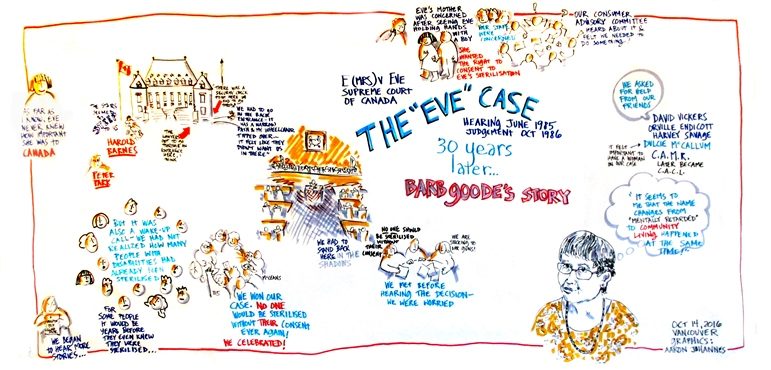
On October 23, 1986 the Supreme Court of Canada ruled unanimously that Eve, a 24-year-old woman with an intellectual disability, could not be sterilized without her consent.
This landmark case, known as the Eve Decision, has had a profound impact on the global movement to fully recognize the rights of persons with intellectual disabilities.
The Supreme Court of Canada’s 1986 Eve Decision was a critical turning point in the struggle for recognition of rights of persons with intellectual disabilities.
Not only did it end the longstanding practice of non-therapeutic sterilization of people with intellectual and other mental disabilities, but in doing so it affirmed that regardless of cognitive ability, all persons have fundamental human rights which cannot be over-ridden even when a person is under guardianship. The court noted:
Sterilization should never be authorized for non-therapeutic purposes under the parens patriae jurisdiction.
In the absence of the affected person’s consent, it can never be safely determined that it is for the benefit of that person.
The grave intrusion on a person’s rights and the ensuing physical damage outweigh the highly questionable advantages that can result from it.
The decision put an end to the most iconic and egregious element of the eugenics era programme ending the longstanding practice of routinely sterilizing both men and women with intellectual disabilities, often with the cloak of legal legitimacy under Acts such as the Alberta Sexual Sterilization Act enacted in 1928 and not repealed until 1972.
The Court was cognizant of this legacy and noted:
There are other reasons for approaching an application for sterilization of a mentally incompetent person with the utmost caution.
To begin with, the decision involves values in an area where our social history clouds our vision and encourages many to perceive the mentally handicapped as somewhat less than human.
This attitude has been aided and abetted by now discredited eugenic theories.
Another critical aspect of the Eve Decision was its recognition that all people, regardless of cognitive capacity, had fundamental human rights which could not be over-ridden even if someone was under guardianship or other forms of substitute decision making.
This went against one of the oldest tenets in western law which fundamentally viewed those with intellectual and other cognitive disabilities as less than persons before the law.
It would be two more decades before Article 12 of the UN Convention on the Rights of Persons with Disabilities definitively expressed the principles that people with disabilities are ‘persons’ before the law and free to make their own decisions regardless of their cognitive ability.
There remains much to be done to bring this right into practice but the Eve Decision was a key milestone on the road to achieving full personhood for people with disabilities.
Eve also marked the emergence of the authentic voice of people with intellectual disabilities to represent themselves and their interests.
The members of the Consumer Advisory Committee of the then Canadian Association for the Mentally Retarded (now the Canadian Association for Community Living) being the first to directly address their views to the Supreme Court of Canada.
Barb Goode, one of the leading self advocates involved in the case, would go on to address the United Nations and be one of many strong and committed self-advocates who affirm and defend the doctrine “Nothing about us without us“ and continue to lead the way in the struggle for the full and unequivocal recognition of the rights of all persons, including those with intellectual disabilities, to full and equal citizenship and inclusion.
CBC News’ The National reported on the decision on October 23, 1986.
The Supreme Court of Canada has ruled that mentally handicapped adults cannot be forcibly sterilized.
Known as the “Eve decision,” the case involved a 24-year-old mentally challenged young woman, “Eve”, who had befriended a young man at a school for students with special needs.
Eve and her boyfriend talked of marriage as their friendship progressed, but school authorities eventually convinced the couple to end their relationship.
Regardless, Eve’s mother was troubled by the possibility of her daughter becoming pregnant and went before the courts seeking provincial authorization to have her daughter sterilized.
As shown in this CBC News report, the Supreme Court said no.
CBC – The National: Court Says No to Forces Sterilization. Click this link to view the original news story and read additional facts.
The Centre for Inclusion and Citizenship is honored to have had the opportunity to review this decision and its importance with Disability Rights Advocate, Barb Goode.
(October 2016)
Thank you to Brian Salisbury for filming and editing the video.
Barb has also shared her story with Aaron Johannes, who created this graphic using her words.

Aaron Johannes can be contacted at www.imagineacircle.com
More information about the Eve Case
This page provide links to other resources that talk about this court decision. Some of the links are to articles in legal journals and are not in plain language.
